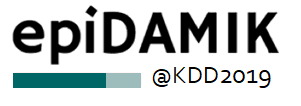
| Time | Event |
|---|---|
| 8:00am-12:00pm | Health Day activities (keynotes, coffee break, and panel). Please see here (page 9). |
| 12:00pm-1:00pm | Lunch provided in Exhibit Hall |
| 1:00pm-1:05pm | epiDAMIK opening remarks |
| 1:05pm-2:00pm | Invited Keynote 1. Benjamin Althouse
[expand]
 Ben Althouse is a Principal Scientist and Co-chair of the Epidemiology team at the Institute for Disease Modeling where he explores pneumococcal pneumonia vaccines, the transmission dynamics of respiratory pathogens, and the role of complex human contact structures on disease transmission. He was an Omidyar Fellow at the Santa Fe Institute, holds a PhD in Epidemiology and a Master of Science in Biostatistics from the Johns Hopkins Bloomberg School of Public Health where he was awarded an NSF Graduate Research Fellowship, and holds Bachelor of Science degrees in Mathematics and Biochemistry from the University of Washington. His previous work has included mathematical modeling of sylvatic dengue virus transmission in nonhuman primates in Senegal, examining the role of antimicrobial use on the evolution of drug resistance, using Twitter as a model system of co-infection dynamics, and using novel data sources (such as Google searches, Twitter, and Wikipedia article views) for population-level surveillance of infectious and chronic diseases. Ben is an Affiliate Faculty member in the Department of Biology at New Mexico State University, Las Cruces, and an Affiliate Assistant Professor at the Information School at the University of Washington. Title: Novel data streams (NDS) for surveillance [expand]
Abstract: Novel data streams (NDS), such as web search data or social media updates, hold promise for enhancing the capabilities of public health surveillance. In this talk I will explore several case-studies of how NDS can be used for infectious disease surveillance; understanding how individuals seek information about health behaviors such as depression and smoking cessation; “organic advocacy” wherein celebrities or other viral announcements affect individual search behavior; “crowd diagnoses” of sexually transmitted diseases on Reddit; and novel surveillance of bed bug infestations. Through these disparate examples of the uses of NDS, I highlight the necessities of accurate model building and thorough and appropriate interpretation of surveillance using NDS.
|
| 2:00pm-2:20pm | Contributed Talk 1. Paper: Improved Automatic Pharmacovigilance: An Enhancement to the MedWatcher Social System for Monitoring Adverse Events Authors: Andre Nguyen, Julia Lien, Edward Raff and Sumiko Mekaru. |
| 2:20pm-2:30pm | Contributed Talk 2. Paper: Machine learning in healthcare - a system’s perspective Authors: Awais Ashfaq and Slawomir Nowaczyk |
| 2:30pm-3pm | Coffee Break |
| 3pm-4pm | Invited Keynote 2. Elaine Nsoesie
[expand]
 Dr. Nsoesie is an Assistant Professor of Global Health at Boston University (BU). She is also a BU Data Science Faculty Fellow as part of the BU Data Science Initiative at the Hariri Institute for Computing, and a Data and Innovation Fellow at The Directorate of Science, Technology and Innovation (DSTI) in the Office of the President in Sierra Leone. Dr. Nsoesie applies data science methodologies to global health problems, using digital data and technology to improve health, particularly in the realm of surveillance of chronic and infectious diseases. She completed her PhD in Computational Epidemiology from the Genetics, Bioinformatics and Computational Biology program at Virginia Tech. She also have an MS in Statistics and a BS in Mathematics. She has written for NPR, The Conversation, Public Health Post and Quartz. Dr. Nsoesie was born and raised in Cameroon. Title: Non-traditional Approaches to Public Health Surveillance [expand]
Abstract: Data from a variety of sources, including social media, e-commerce websites and remote sensing, offer unique opportunities for studying and addressing problems in public health. In this talk, we will present examples on the use of data from a variety of sources for public health surveillance. We will also discuss the biases inherent in these datasets and potential implications on the public’s health.
|
| 4:00pm-4:20pm | Contributed Talk 3. Paper: Improving Outbreak Detection with Stacking of Statistical Surveillance Methods Authors: Moritz Kulessa, Eneldo Loza Mencía and Johannes Fürnkranz |
| 4:20pm-4:40pm | Contributed Talk 4. Paper: A Visual Analytics Framework for Analysis of Patient Trajectories Authors: Kaniz Madhobi, Methun Kamruzzaman, Ananth Kalyanaraman, Eric Lofgren, Rebekah Moehring and Bala Krishnamoorthy |
| 4:40pm-5:00pm | Discussion and Closing Remarks. |
| 7:00pm-9:30pm | Joint KDD Poster Reception at Idlughet Hall 3- Street Level, Denaina. |